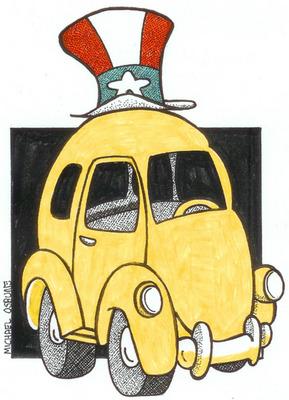- MENU
- HOME
- SEARCH
- VIDEOS
- WORLD
- MAIN
- AFRICA
- ASIA
- BALKANS
- EUROPE
- LATIN AMERICA
- MIDDLE EAST
- United Kingdom
- United States
- Argentina
- Australia
- Austria
- Benelux
- Brazil
- Canada
- China
- France
- Germany
- Greece
- Hungary
- India
- Indonesia
- Ireland
- Israel
- Italy
- Japan
- Korea
- Mexico
- New Zealand
- Pakistan
- Philippines
- Poland
- Russia
- South Africa
- Spain
- Taiwan
- Turkey
- USA
- BUSINESS
- WEALTH
- STOCKS
- TECH
- HEALTH
- LIFESTYLE
- ENTERTAINMENT
- SPORTS
- RSS
- iHaveNet.com: Economy
by Matthew Bandyk

Has cash-for-clunkers stimulated the economy?
I argued that it's too early to tell because all we know is that there have been car sales. But Daniel Gross at Slate makes the case that the evidence is in, and cash-for-clunkers gets a pretty good return as stimulus:
If we use Taylor's estimate, about 250,000 extra cars were purchased (40 percent of 625,000). And if each cost $29,000, those sales generated about $7.3 billion in revenue in the space of a few weeks. That's a pretty good return on $2.6 billion in government spending. Let's be more conservative. Say only 20 percent of the clunker traders were extra demand, and the cars they bought cost $25,000 each. That's still an extra $3.125 billion in sales for dealers.
Gross compares that return to an estimated $1.9 billion return in new retail spending from $3 billion in tax rebates.
But I'm still not convinced.
For one, it seems way too early to be estimating how many new car sales cash-for-clunkers might have created, as opposed to just getting people who were already going to buy cars to make their purchases a little earlier. Gross's source for those numbers is an economist from the
But Gross does go with a conservative estimate of Taylor's numbers, so I'll give him the benefit of the doubt. Assuming that cash-for-clunkers created at least some new car sales in an amount greater or equal to the amount of money put into the program, isn't that real stimulus?
Not necessarily. It all depends on what the dealers do with the money they're getting from these new purchases. The program could just be transferring money from consumers to dealers--in which case, we might as well have just handed out the funds for the program. Richard Posner explains:
It is true that people who participated in the "cash for clunkers" program couldn't pocket rather than spend the money they received from the government, as they could with the other transfer payments included in the stimulus program; they had to use it to help them buy a new car. But that is different from paying a road contractor to build a new highway. The contractor as I said has to go out and hire people to build it, so unemployment falls (on the assumption, correct with regard to construction, that there is a high rate of unemployment in the industry). The purchase of a new car merely reduces a dealer's inventory, and whether the reduction leads to new production will depend on estimates of future demand.
Also, Gross does not consider the value that has been destroyed by cash-for-clunkers. For each of those new cars purchased, there was an old clunker that was scrapped. Putting environmental concerns aside, these cars are no longer available to be purchased on the used market. Maybe that's not enough of a negative effect to cancel out the stimulus from the new cars. But the impact on the used car market is a cost that falls on the people hit hardest by the recession--poorer people who can't afford a new car, even with a government voucher. Used car prices are likely to rise due to lower supply in the coming weeks and months.
So cash-for-clunkers might have had some stimulative effect. But it seems like a pretty inefficient way to do that--if you really wanted to drum up consumer spending, we could have just offered the $3 billion as a rebate toward any consumer purchases (that's different than the rebates Gross mentions, which are just checks in the mail to be used for any purpose). That money would dry up fast, for sure, but it wouldn't hurt poor consumers like cash-for-clunkers. The reason Congress picked cars specifically, and not other consumer goods, seems to have more to do with the political influence of manufacturers and dealers rather than sound economics.
© U.S. News & World Report
WORLD | AFRICA | ASIA | EUROPE | LATIN AMERICA | MIDDLE EAST | UNITED STATES | ECONOMY | EDUCATION | ENVIRONMENT | FOREIGN POLICY | POLITICS
Maybe Cash For Clunkers Helped The Economy After All